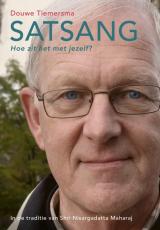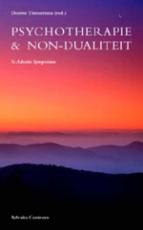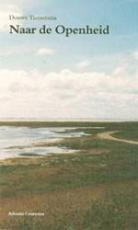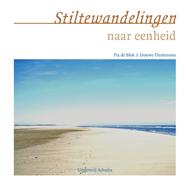Advaita Post 10 - 11 The spiritual learning process...
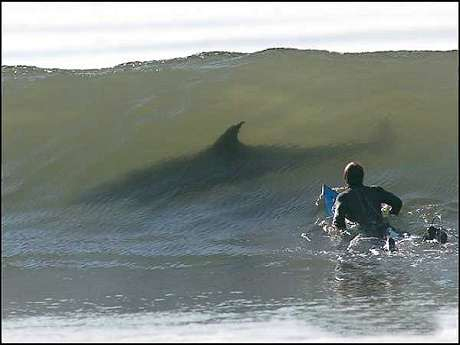
Also stay universally aware this summer
The text below
Some parts of the presentation of the book Non Duality - the groundless openness have already been used in earlier Advaita Posts. Here below is the fully developed speech from Otto Duintjer. As noted (see also Advaita Vedanta. The question of self-being) he has, with great affinity, some counter points and questions about various aspects of the advaita teaching. Those objections and questions are worth one's aquaintence for everyone who finds the advaita approach important. They evoke a critical awareness of what is really important. For this reason Otto's text has been integrally presented here. Because the text is rather long, Douwe's response which was given during the presentation will appear in the following Advaita Post. During the summer interval everyone has the chance to examine for themselves what meaning Otto's points have for their own orientation.
Text
From the presentation of the book Non-Duality, November 21, 2008 at Boekhandel Donner, Rotterdam.
Otto Duintjer
To begin with: Douwe, congratulations on the publication of yet another book. There have already been many indications for several years that Gouda sparkles with energy, which has not decreased since ending your active teaching period at the Erasmus University of Rotterdam. I'll hold off from other compliments now, because I've heard that I have a limited time for speaking.
I will speak freely and rather dualistically on the subject of 'non duality' by making restrictions and objections. I am grateful that Douwe has asked me to say something here today as we frequently converse together on other occasions. I certainly have a few objections to the things which Douwe sets forth. I suppose that's because I have a different feeling for life than he does, and to bring that up at a book presentation didn't seem appropriate to me. But Douwe held fast and, non-dual as he is, said that's exactly how it should be. Thus I feel myself now additionally free in my contribution.
At the same time, the invitation was a challenge, because I would like, for myself, to look once again more precisely. What is the kind of spirituality in which Douwe is involved? Which he represents and expresses at a high level? I would not argue with the quality of the expression, but content wise I frequently see points which call for a reaction. And that doesn't concern just a fragment. Where does that red thread lead, when I would rather have seen a thread of a different color? I must say: he's not one to catch in a hole. Sometimes I had the feeling that I had found a main point of contention, up until last night. But this morning I thought: "Yes, but he also says that and that." So then the criticism didn't entirely fit. Nevertheless I'd like to point out a few possible points of differences. I can't develop them entirely here because there's not the time for it, let it be that I can only explain how I see it.
Preference for the undifferentiated
It starts with the main point which has already been delineated by three other speakers: the kind of emphasis which Douwe lays - differently than I would tend to do - on a certain type of experience, namely the experience of what he calls "the great empty space", or "the nothing in which all things merge and fall away". It's called an experience of total openness without forms, without separations and without qualities. That refers pre-eminently to what he means by the term 'non duality'.
Now I don't dispute that such an experience can appear and he is such a good teacher that he can summon it now and again. I do, however, have a question mark with presenting such an experience as the highest (whereby then it would appear to be optimal to always find oneself in that state) and that the experienced reality then would be the reality.
One of his descriptions of that experience is for example that the state is before every creation, therefore also before all differences. I don't deny that such experiences occur. I don't deny that they can be valuable and instructive, but that they are the highest, are the most important and in fact the standard by which the quality and the importance of all other experiences can be measured, -- that I doubt. You can call that dispute, but more discreetly it's to ask the question: why should that state which precedes all creation be far more important to us than the great and precarious creation which has then just begun (for example evolution, and the whole history of mankind), more important than all the beautiful and all the difficult things which appear over the course of time, which teach us lessons and in each situation deserve our respectful attention? Why should all of that be less important than that state of a Nothing without distinctions which has always existed? Of course, Douwe himself is subtle enough to make nuances in each case, when you come to him with objections. But his emphasis can be taken in the sense that there is at least the risk in concluding that duality, and therefore separations, are found to be less important. His fixed reference for that experience also begins with a negation: 'non duality'; a traditional expression, but not a very fortunate one, since it sounds as if duality is something to be denied or ignored. For myself, I try to use words for the 'non-dual' dimension which indicate its characteristic feature, but then in such a way so that the importance of the dual enters into the expression. I call it, for example, a boundless manifestation space where each and every part of consciousness has a place and within which all phenomena and dualities can manifest. Not a quality-less emptiness, but rather a manifestation space, which grants all phenomena the possibility to appear and with that guarantees their importance as phenomena. Notion of that open manifestation space reinforces and illuminates the attention for that which appears within it, for what manifests itself, therefore for what we get to see, hear and feel.
In connection with the previous I also have an objection to a certain phraseology that Douwe frequently uses, I refer to the expression 'let go', to the sense in which he uses that word and the primary emphasis he lays upon it. Everyone here knows that it's important to learn to let go of things, in the sense of: not to cling, not to be addicted. It seems to me just as important to first learn to let in what we see, hear and feel into our consciousness, to let it pervade you, to set itself forth into you. Then release can consciously come in order. The word release Douwe uses especially in the sense of 'letting dissolve' (such as certain substances dissolving in water), let flow, flow away. He gives somewhere an example of an amoeba which lets its own plasma flow out. 'Dissolve in the Openness' - the naturalness with which this medicine is always recommended would also point to a so called preference for undifferentiated reality, in which dualities and differences don't play a role, so that problems and tensions which arise with and between different manifestations can in this way be removed and flow away. But have such manifestations even had the chance to deliver their message first?
I wouldn't do right by Douwe, if I were to say that he had no interest in differentiation. There are, for example, great passages in the third and sixth chapter which mention it. In the third chapter he writes about the many 'viewpoints': each animal type observes the world in its own manner and that applies even more so to people with their changing points of view and perspectives through the course of the time and in differing situations. Therefore difference certainly plays a role with him didactically. But then still, the point and full emphasis lies with that within which all points of view 'dissolve'.
'Inclination' towards the positive
When Douwe speaks about various matters and different phenomena, his attention and interest seem to go outwards toward the rose colored aspects of life. He often seems to minimize the troublesome, to my feeling. The state without form and qualities seems to steadily lead him to freedom, peace, joy, harmony, and that is, thank god, an important side of reality. When we become somewhat more open, we will experience from time to time that there is enough to bring us delight, or at least to make us satisfied and to give us a freer feeling. But becoming more open - I would use the word just as easily and as often as Douwe does - means in my opinion becoming more open for what happens to appear and that always has another side to it, therefore duality (a word that ordinary means twoness and distinction; 'dualism' is something else). Duality of summer and winter, of day and night, of luck and suffering, which can create relaxation and effort, or tenderness and cruelty, honesty and fraud, gallantry and cowardice etc., around us or within us. Learning to live with that and to communicate within it seems to me to be at least as important as that of a reality in which all distinction has disappeared.
On a particular point I certainly have had a criticism of the Christian mystic John of the Cross, who repeatedly says that we must learn 'to incline', according to him, more to the difficult than to the easy, to the heavy than to the light, more towards the unpleasant than to the pleasant. On the other hand, it seems to me that the spiritual learning process is a sort of balancing act, a tightrope, walking on a razor's edge, where your consciousness maintains a contact with both sides with both extremes and without leaning too much. It is already quite a lot to keep one's balance between both poles, to do what's right without letting yourself become overwhelmed, yet nevertheless allowing things into your consciousness when they manifest themselves. With Douwe I see a tendency somewhat to lean, but then only to the rosy, idyllic side, 'the wind in the dunes' and such.
Physicality
I would like to conclude with a more specific point of difference between him and me, or actually a point where I have a question because it could be that I have misunderstood. If that's the case, then let's resolve it immediately today in the openness, but it can also be that what he says is simply not correct. This question seems to me to lead to a yes or no answer. That's also sometimes very nice.
The subject lies coincidentally on the terrain for which I have accepted for years that we are most compatible, namely that of the connection of spirituality with physicality, the body. In my life that has been a discovery. After having lived many long years especially intellectually, I had my first explicit spiritual opening as a sort of ‘out of body experience’ as if person and body had died. Bodily feeling (feeling your whole body from the inside out) was for me at that time not strongly developed. At the same time (the end of the 60's and beginning of the '70s) serious changes took place in my concrete situation: socially, in my family, my position and work at the university. While still full of the 'vertical' experiences of the infinite openness, I was immediately faced with all kinds of turbulences in my 'horizontal' surroundings. Luckily I then received clear signals and possibilities for learning to stay more connected with both dimensions. More development of bodily feeling ('from head to foot') proved thereby to be an important component (in addition to contact with repressed feelings etc.), in short learning 'earthing' or 'grounding'. So I had learned via tai-chi teachers, a teacher of hatha yoga and a couple years with the hard hand of Nadine Scott, an American psychotherapist (from Lowen's school) who worked with Gestalt and bio-energetic exercises, to feel my body from the inside out. When I came into contact with Douwe later, I thought: however much I have a question mark about his emphasis on extreme openness, we at least have in common that we both take physicality seriously. That is, as it were, a complementary counterpoint. Then everything remains in balance and you continue to feel the ground and follow your breath which takes place in the here and now. Therefore when you wander here and there with your thoughts, you always return by means of your body feelings to the ground and the situation in which you physically exist. For me that also means: feeling keeps you in contact with your finitude, encompassed by the infinite.
But now I gradually see - and in this book I feel it explicitly - that Douwe is particularly interested in physicality as something `energetic'. And that means that physicality is partially associated with the fluid and the contour-less. Bodily feeling would, according to him, be the fastest way to experience borderlessness. In my life experience however my body is just there - except as a contact point with the infinite openness - as a mortal body occupying a certain spot in concrete situations. Now in this book he says it literally - and concerning this I think I can get a yes or no answer - that the fastest way to that infinite openness is by means of feeling with the physical senses. Thus, with your physical senses you can feel the infinitude of the universe. With the help of directed exercises he leads you to feel your body from the inside-out and then asks: "Where do you feel a border?" Someone then says: "With the skin". "That's not really a border", Douwe then says. And so it continues. "Feel now to the left and notice that there is no border; and to the right, forward and back", and three sentences further we are already at the end of the universe! No, not the end, of course, but at the borderlessness of the universe. You feel each time 'there are no boundaries' and so with large steps you rapidly come home (a medieval proof of god shrinks to insignificance in comparison with this!). Now I had certainly noticed, since I had learned to feel somewhat more with the body, that the bodily feeling can reach further then the physical skin. I can feel if there are people in the neighborhood, or if an animal runs by this way. I can have physical perceptions if I come into a house where a strained environment dominates, and physically sense the difference between the environment in a hospital, a factory or a church. But in my opinion physical perception rapidly halts in space. How far can you feel with your bodily sense? I cannot physically feel if my neighbors are at home, let alone can I feel the inside of the houses on the other side of the street or through all walls and autos that pass by. And then I am still here on the west side of Amsterdam. But perhaps I am mistaken. Hence my question now: Douwe, do you really mean that you can physically feel and touch through such distances and then can go borderless sensing away through everything? Or is this in fact not about feeling but rather an exercise in imagination?
This concerns then a few differences I have with what Douwe says. But we know we are connected.
Er is geen tweeheid
als je ontspannen bent
in zelf-bewustzijn
is dat duidelijk.
Boeken
Douwe schreef en redigeerde gedurende zijn leven boeken. Via onze uitgeverij zijn deze nog verkrijgbaar.
